The Heartland Flyer passenger rail service, which connects Fort Worth to Oklahoma City, has secured $3.5 million in emergency funding to continue operations for another year, following the Texas Legislature’s failure to approve the state’s share of funding.
The emergency funding prevented a shutdown that would have eliminated Oklahoma’s only passenger rail connection.
The North Central Texas Council of Governments’ (COG) Regional Transportation Council approved the critical funding using regional toll revenue, ensuring the service will run through at least September 2026.
“The North Central Texas Council of Government’s Regional Transportation Council has done what the state of Texas shirked it’s [sic] responsibilities in doing … fund the Heartland Flyer passenger rail service,” Texas Rail Advocates (TRA) announced in a statement on Thursday.
“It’s a sad state of affairs when the Texas Department of Transportation asked for funds for this critical intercity surface transportation link between Fort Worth, Gainesville, and Oklahoma City, and state legislators turned TxDOT down”, said TRA President Peter LeCody.
“TxDOT partners with the Oklahoma Department of Transportation to support this service that last year carried over 80,000 passengers. It was a case of a handful of politicians at the Capitol with an anti-passenger rail agenda refusing to pass an appropriation that the Texas Transportation Commission asked for in TxDOT’s legislative budget request,” he added.
The funding comes at a crucial time, as prior shortfalls threatened to halt the service after September 30, 2025. Without this intervention, both Oklahoma and Texas would have lost a vital transportation link that carried 82,000 riders in 2024.
In a joint letter signed by Fort Worth Mayor Mattie Parker, Gainesville Mayor Tommy Moore, and Denton County Judge Andy Eads, officials wrote that the Heartland Flyer has “been key to our regional success as a global destination and has been central to our tourism industry, business community, and thriving economy.”
The letter noted that “sustaining the Heartland flyer is crucial to ensuring continued momentum and mobility in Texas,” according to the Fort Worth Report.
The train service could prove especially critical in 2026, when FIFA World Cup events are expected to draw tens of thousands of visitors to the North Texas region.
Oklahoma Senator Mark Mann (D-Oklahoma City) emphasized the broader implications of keeping the service operational.
“Ending the Heartland Flyer would have been a tremendous loss for both states, especially as we’re on the verge of expanding that service in Oklahoma to Kansas and beyond,” he said.
“That’s why I’ve continued to work with advocates in Texas in both the private sector and in government to find a way to keep the Heartland Flyer running. This vote will keep this important transportation service going,” Mann added.
The emergency funding represents a significant diversion from regional toll revenue. Still, supporters argue the investment pays dividends through millions of dollars in annual economic benefits to both states. TRA cited a 2010 study that showed that every dollar that Texas spends to subsidize the Heartland Flyer is returned fivefold in economic benefits to the cities and regions it serves.
The Heartland Flyer holds special significance for Oklahoma, which had been without passenger rail service for two decades before the line was launched through a cooperative agreement between Oklahoma and Texas.
According to Michael Morris, the transportation director for the COG, keeping the train service in operation is critical for another reason: the federal government would likely seek reimbursement from the state for federally funded infrastructure grants if the train ceased to operate.
“I can’t imagine that happening under my watch,” Morris said, per FWR.
While the approval guarantees operations for the next year, officials acknowledge this represents a temporary fix. The council will pursue a longer-term funding solution while the service continues running, and will also launch a ridership campaign to help mitigate the need for subsidies.
The funding approval also comes as expansion plans for the route gain momentum. Officials are exploring the possibility of extending service from Oklahoma into Kansas and potentially beyond, making the current year’s reprieve even more significant for regional transportation planning.


